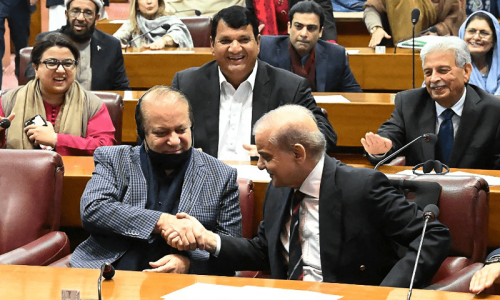NEW DELHI: Unheard of political alliances. Accusations of vote-buying to the tune of more than $6 million an MP. Criticisms of shady corporate lobbying with one of the world’s richest men.
With the fate of the Indian government dependent on a confidence vote on Tuesday, mudslinging and deal-making are in full swing and even sullying the relatively clean image of Prime Minister Manmohan Singh.
Singh, a soft-spoken former finance minister, was forced to call a confidence vote after his communist allies withdrew their support for the government to protest a civilian nuclear deal with the United States.
Singh believes he will survive the vote after securing support of the regional Samajwadi Party. The vote is essentially between a ruling Congress party coalition and the Hindu nationalist-led opposition and the communists.
If the government loses the vote, early elections will be called, probably this year. It will lead to political uncertainty just as the government battles rising inflation and interest rates, as well signs of fiscal strains and economic slowdown.
“The prime minister expressed confidence that the people of India understood the significance of the initiatives being taken by the UPA government and endorse them,” according to a statement by the prime minister’s office late on Tuesday.
The vote will likely hang on a score of votes, mainly from smaller parties and independents, in the 543-member parliament.
So close is the vote, parties from all sides have stepped up their battles and rhetoric to secure votes.
“The government will not survive the trust vote even when it’s indulging in large-scale horse trading,” Vijay Kumar Malhotra, a senior leader of the Hindu nationalist Bharatiya Janata Party, told the Indian Express.
He estimated the government only had 250 votes of the 272 needed for a majority.
The communists, angry at what they see as the government’s betrayal over a nuclear deal they say makes India a pawn of Washington, announced an alliance with Mayawati, the chief minister of Uttar Pradesh, over the confidence vote.
It was an unheard of alliance and a sign of high stakes of the vote. The Communist Party of India (Marxist) and Mayawati, one of India’s best known, have been enemies for years.
The government’s own alliance with Samajwadi has sparked criticism the prime minister was allowing his government to bend to its conditions, from judicial probes into political enemies of the party to helping corporate allies of the regional party.
The timing of news that the CBI, India’s equivalent to the FBI, could probe Mayawati, raised criticism of an under-the-table deal. Mayawati is the main political enemy of the Samajwadi.
The communists also sparked a storm with accusations that MPs were being bribed for their support.
A.B. Bardhan, head of the Communist Party of India, said the going rate was around $6 million to guarantee a vote. He produced no evidence, although India has seen a string of scandals in recent years when MPs have accepted bribes to change sides.
The prime minister sparked more criticism for meeting with one of the feuding billionaire Ambani brothers, whose businesses make up about 5 per cent of the Asian giant’s economic output.
Samajwadi’s leader Amar Singh has close links to Anil Ambani, the head of Reliance Communications, who has been in a long dispute with his even richer and elder brother Mukesh, chairman of Reliance Industries.
So when Mukesh Ambani met the prime minister on Monday, it sparked headlines that he was trying to defend his business interests amid fears his brother now enjoyed greater access to the government thanks to his SP links.
The meeting followed Amar Singh saying his party would push for a windfall tax on private oil refiners, a move that would directly hurt Mukesh’s business.
“The new found friendship with the likes of Amar Singh ... the sudden entry of corporate bosses in the picture have clouded the image of probity which the prime minister has assiduously built up over the years,” the Asian Age said in an editorial. —Reuters













































Dear visitor, the comments section is undergoing an overhaul and will return soon.